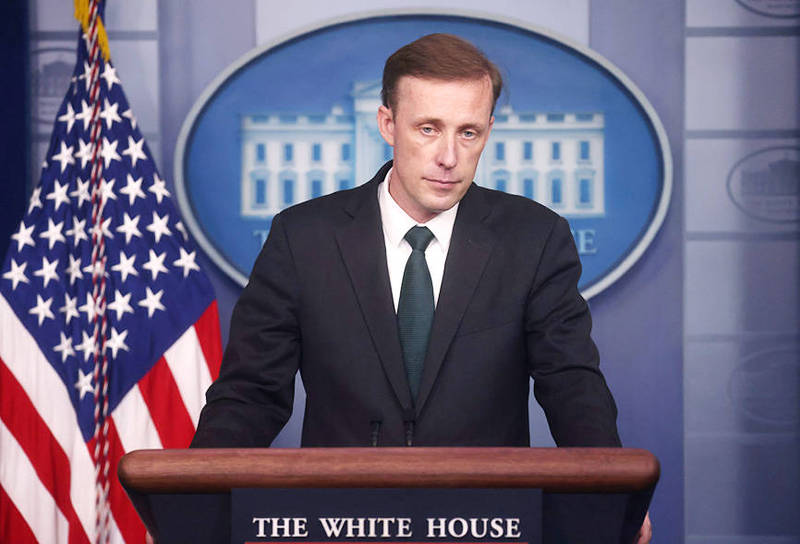《TAIPEI TIMES》 Tsai says Taiwan needs to be stronger

US National Security Adviser Jake Sullivan speaks at a news briefing at the White House in Washington on Tuesday. Photo: Reuters
‘SELF-RELIANCE’: The president said the discussion over Afghanistan leads to the conclusion that Taiwan needs to be more united and more resolute in defense
/ AFP and Bloomberg, with staff writer
Afghanistan’s return to Taliban rule following the withdrawal of US forces shows that Taiwan needs to be “stronger and more united” in ensuring its own defense, President Tsai Ing-wen (蔡英文) said yesterday.
The sudden departure of US troops from Kabul has sparked discussion in Taiwan as to whether Washington can be relied upon to come to Taipei’s defense.
“Recent changes in the situation in Afghanistan have led to much discussion in Taiwan,” Tsai wrote on Facebook. “I want to tell everyone that Taiwan’s only option is to make ourselves stronger, more united and more resolute in our determination to protect ourselves.”
She said that Taiwan should practice self-reliance.
“It’s not an option for us to do nothing ... and just to rely on other people’s protection,” she wrote.
She added that Taipei cannot rely on “momentary goodwill or charity from those who will not renounce the use of force against Taiwan,” an apparent reference to Beijing.
Beijing’s state media have reveled in the US pullout from Afghanistan, publishing a series of editorials predicting that Washington would not come to Taiwan’s aid in its hour of need.
Analysts have said that Afghanistan and Taiwan are not comparable.
Taiwan “is a core interest for the US in that it is a well-functioning
democracy, loyal ally, [with] a capable military and directly standing up to America’s most important competitor,” said Robert Kelly, an international relations expert at Pusan National University in Busan, South Korea.
“Afghanistan was on the fringe of US interests. A better analogue ... is Israel,” Kelly wrote on Twitter.
Separately, the Ministry of Foreign Affairs yesterday thanked Washington for reiterating its commitment to Taiwan and other allies.
The administration of US President Joe Biden has repeatedly expressed its “rock solid” commitment to Taiwan and supported the sentiment with practical action, ministry spokeswoman Joanne Ou (歐江安) said.
Taiwan would resolutely continue to improve its self-defense capabilities to safeguard the lives and property of Taiwanese, as well as their free and democratic way of life, Ou said.
Cooperation between Taiwan, the US and other nations would ensure stability in the Taiwan Strait, she said, adding that Taiwan would continue contributing to lasting peace, stability and prosperity in the Indo-Pacific region.
The ministry made the comments after US National Security Adviser Jake Sullivan on Tuesday reaffirmed Washington’s “sacrosanct” commitments to its allies, including Taiwan, pushing back at concerns about its resolve after its departure from Afghanistan.
“We believe that our commitments to our allies and partners are sacrosanct and always have been,” Sullivan told a news conference in Washington.
“We believe our commitment to Taiwan and to Israel remains as strong as it’s ever been,” he added.
When asked how Washington is countering questions about its resolve from Beijing and Moscow, White House press secretary Jen Psaki said: “We, of course, are in touch with the Chinese and the Russians.”
“Our message is very clear: We stand by partners around the world who are subject to this kind of propaganda that Russia and China are projecting, and we’re going to continue to deliver on those words with actions,” Psaki said.
Max Baucus, a former US ambassador to Beijing, said in an interview with Bloomberg Television that Chinese President Xi Jinping (習近平) might be emboldened to test the US over Taiwan.
“The development in Afghanistan is going to cause Xi Jinping to probe a little bit,” Baucus said. “He’s going to test to see the degree to which we are going to stand up for Taiwan.”
Xi will “look for openings,” he said. “He’ll probe here, probe there. That’s their history.”
新聞來源:TAIPEI TIMES














